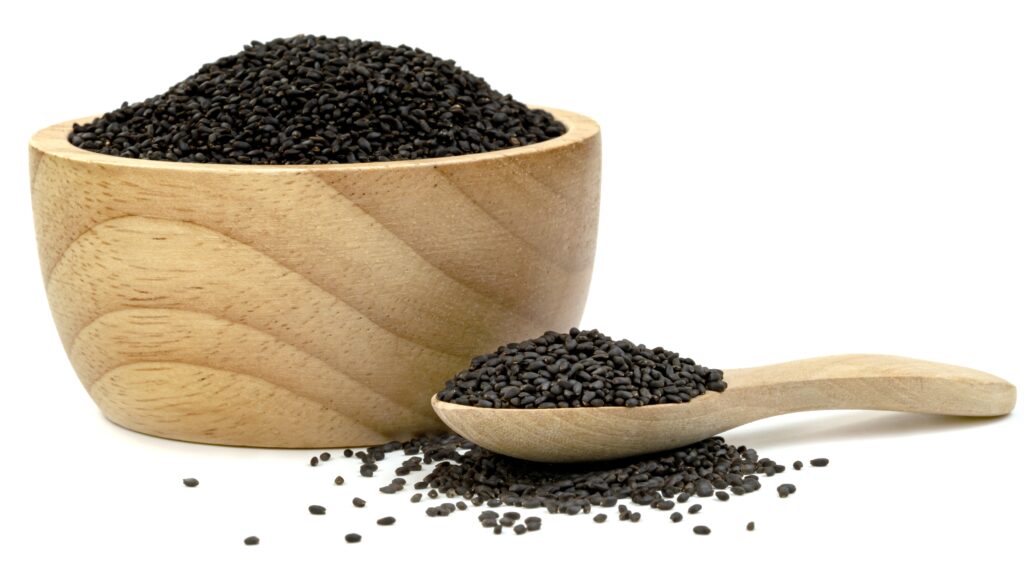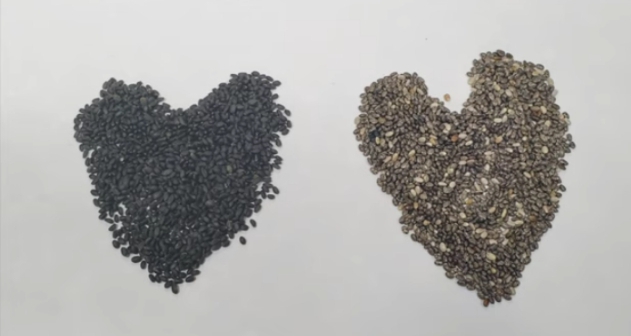The Tiny Titans of Nutrition: Unveiling the Differences Between Basil Seeds and Chia Seeds
In the world of superfoods, tiny titans like basil seeds and chia seeds reign supreme. Packed with an impressive nutritional punch, these little powerhouses have become staples in health-conscious kitchens worldwide. But with such similar appearances, a question often arises – what truly sets basil seeds apart from chia seeds? Let’s embark on a journey to decode these nutritional gems, exploring their unique properties and potential benefits.
A Tale of Two Seeds: Origins and Appearance
- Basil Seeds (Sabja Seeds): Hailing from the holy basil (Ocimum tenuiflorum) plant native to Southeast Asia, basil seeds are also known as sabja seeds or tukmaria. These tiny, jet-black ovals are harvested from the basil plant’s flower spikes and boast a smooth, matte texture.
- Chia Seeds (Salvia hispanica L.): Sourced from the Salvia hispanica plant, native to Central and South America, chia seeds come in a variety of colours, including black, white, brown, and even a speckled variety. These oval-shaped seeds have a slightly glossy surface and a mild, nutty flavour.

The Power Within: A Nutritional Breakdown
Both basil and chia seeds are nutritional powerhouses, but their strengths lie in different areas. Here’s a closer look:
- Fiber: Chia seeds take the crown in terms of dietary fiber, boasting around 10-13 grams per 30 grams (1 ounce) serving. This fiber content promotes gut health, satiety, and can help regulate blood sugar levels. Basil seeds, while still a good source of fiber (7 grams per 30 grams), are lower in comparison.
- Omega-3 Fatty Acids: Chia seeds shine again, holding the title for the higher concentration of omega-3 fatty acids, particularly alpha-linolenic acid (ALA). These essential fats are crucial for brain function, heart health, and may even reduce inflammation. While basil seeds contain some omega-3s, the amount is significantly lower.
- Protein: Both seeds offer a decent amount of protein, with chia seeds slightly higher (around 4-5 grams per 30 grams) compared to basil seeds (around 3 grams per 30 grams). This plant-based protein can be a valuable addition to vegetarian or vegan diets.
- Minerals: Basil seeds hold the edge when it comes to certain minerals. They are a richer source of iron, calcium, and potassium compared to chia seeds. Iron is essential for red blood cell production, calcium is vital for bone health, and potassium plays a role in regulating blood pressure.
Beyond the Basics: Unique Properties
Each seed possesses unique characteristics that contribute to their potential health benefits:
- Basil Seeds: These tiny titans are known for their impressive swelling ability. When soaked in water, basil seeds can expand up to 20 times their size, creating a gel-like substance. This can promote feelings of fullness, potentially aiding in weight management. Additionally, basil seeds are believed to have cooling properties, making them a popular choice in hot climates.
- Chia Seeds: Chia seeds have a reputation for forming a gel-like substance when soaked. This gel can help slow down digestion, leading to a more stable rise in blood sugar levels after meals. Additionally, the unique combination of fiber and protein in chia seeds can contribute to a feeling of satiety, potentially aiding in weight management efforts.

Culinary Delights: Incorporating These Seeds into Your Diet
Both basil and chia seeds are incredibly versatile ingredients, easily incorporated into various dishes:
- Basil Seeds: Soaked basil seeds can be enjoyed in drinks like falooda, a refreshing Indian dessert. They can also be added to smoothies, puddings, and yogurt bowls for a textural and nutritional boost. In some cultures, basil seeds are used as a thickening agent in soups and stews.
- Chia Seeds: Similar to basil seeds, chia seeds can be soaked and enjoyed in beverages, smoothies, and puddings. Their mild, nutty flavour complements both sweet and savory dishes. Chia seeds can be sprinkled on salads, cereals, or yogurt for added texture and nutrition. They can even be ground into flour and used in baking.
Choosing Your Champion: When to Use Basil Seeds or Chia Seeds
The best seed for you depends on your specific needs and preferences:
- For Higher Fiber and Omega-3s: Opt for chia seeds if you’re looking for a higher dose of fiber and omega-3s.
- For Iron, Calcium, and Potassium: Basil seeds are the better choice if increasing your intake of iron, calcium, and potassium is a priority.
- For Weight Management: Both seeds can be beneficial for weight management due to their fiber and protein content.
Beyond Nutrition: Exploring the Traditional Uses of Basil and Chia Seeds
The story of these tiny titans extends beyond their nutritional prowess. Both basil and chia seeds have deep roots in traditional medicine and hold significant cultural value:
- Basil Seeds: In Ayurveda, the ancient Indian medical system, basil seeds are considered a cooling and detoxifying agent. They are believed to improve digestion, reduce inflammation, and promote overall well-being. Basil seeds are also used in some cultures for their purported beautifying properties, with topical applications believed to improve skin health.
- Chia Seeds: Chia seeds were a staple food source for the Aztecs and Mayans. They were valued for their high nutritional content and believed to possess energy-boosting properties. In some cultures, chia seeds are used in traditional healing practices for their potential anti-inflammatory and digestive benefits.
The Science Behind the Stories: Research and Future Directions
While traditional uses offer valuable insights, scientific research is crucial to fully understand the health benefits of these seeds. Here’s a glimpse into ongoing research:
- Basil Seeds: Studies are investigating the potential of basil seeds for managing blood sugar levels, reducing inflammation, and aiding in weight management. However, more research is needed to confirm these potential benefits.
- Chia Seeds: Research suggests chia seeds may support weight management, heart health, and blood sugar control. However, the long-term effects and specific mechanisms of action require further investigation.
Safety Considerations: A Note of Caution
Despite their generally safe reputation, a few things are worth keeping in mind:
- Quantity Matters: While both seeds are safe in moderation, excessive consumption can lead to digestive discomfort due to their high fiber content.
- Choking Hazard: Due to their small size, both chia and basil seeds can pose a choking hazard for young children. Supervision is essential when children consume these seeds.
Conclusion: Tiny Titans with Mighty Potential
Basil seeds and chia seeds, while similar in appearance, pack distinct nutritional punches and offer unique benefits. Understanding their strengths and weaknesses allows you to choose the seed that best aligns with your dietary needs and preferences. Whether you’re seeking a source of fiber, omega-3s, or specific minerals, these tiny titans can be valuable additions to a healthy diet. Remember, incorporating them into your culinary creations adds not just flavor and texture but also a touch of ancient wisdom to your plate. As research continues to explore the potential benefits of these seeds, their role in promoting a healthy and balanced lifestyle may solidify even further.
Additional Considerations:
- Sustainability: Both basil and chia seeds can be relatively sustainable crops. However, it’s important to choose ethically sourced seeds whenever possible.
- Variety is Key: Don’t limit yourself to just one seed! Experimenting with both basil and chia seeds in your diet allows you to reap the benefits of their combined nutrients.
- Consult a Healthcare Professional: If you have any underlying health conditions, consult with your doctor before incorporating large quantities of these seeds into your diet.
By embracing these tiny titans of nutrition, you can embark on a flavorful journey towards a healthier you!

